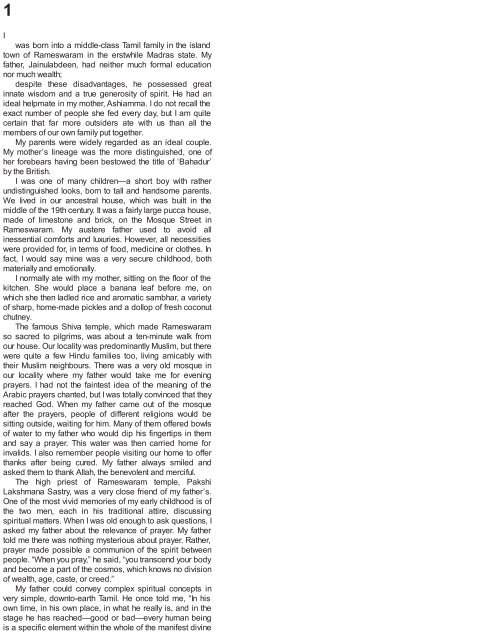wings-of-fire-by-abdul-kalam-printers1
You also want an ePaper? Increase the reach of your titles
YUMPU automatically turns print PDFs into web optimized ePapers that Google loves.
1<br />
I<br />
was born into a middle-class Tamil family in the island<br />
town <strong>of</strong> Rameswaram in the erstwhile Madras state. My<br />
father, Jainulabdeen, had neither much formal education<br />
nor much wealth;<br />
despite these disadvantages, he possessed great<br />
innate wisdom and a true generosity <strong>of</strong> spirit. He had an<br />
ideal helpmate in my mother, Ashiamma. I do not recall the<br />
exact number <strong>of</strong> people she fed every day, but I am quite<br />
certain that far more outsiders ate with us than all the<br />
members <strong>of</strong> our own family put together.<br />
My parents were widely regarded as an ideal couple.<br />
My mother’s lineage was the more distinguished, one <strong>of</strong><br />
her forebears having been bestowed the title <strong>of</strong> ‘Bahadur’<br />
<strong>by</strong> the British.<br />
I was one <strong>of</strong> many children—a short boy with rather<br />
undistinguished looks, born to tall and handsome parents.<br />
We lived in our ancestral house, which was built in the<br />
middle <strong>of</strong> the 19th century. It was a fairly large pucca house,<br />
made <strong>of</strong> limestone and brick, on the Mosque Street in<br />
Rameswaram. My austere father used to avoid all<br />
inessential comforts and luxuries. However, all necessities<br />
were provided for, in terms <strong>of</strong> food, medicine or clothes. In<br />
fact, I would say mine was a very secure childhood, both<br />
materially and emotionally.<br />
I normally ate with my mother, sitting on the floor <strong>of</strong> the<br />
kitchen. She would place a banana leaf before me, on<br />
which she then ladled rice and aromatic sambhar, a variety<br />
<strong>of</strong> sharp, home-made pickles and a dollop <strong>of</strong> fresh coconut<br />
chutney.<br />
The famous Shiva temple, which made Rameswaram<br />
so sacred to pilgrims, was about a ten-minute walk from<br />
our house. Our locality was predominantly Muslim, but there<br />
were quite a few Hindu families too, living amicably with<br />
their Muslim neighbours. There was a very old mosque in<br />
our locality where my father would take me for evening<br />
prayers. I had not the faintest idea <strong>of</strong> the meaning <strong>of</strong> the<br />
Arabic prayers chanted, but I was totally convinced that they<br />
reached God. When my father came out <strong>of</strong> the mosque<br />
after the prayers, people <strong>of</strong> different religions would be<br />
sitting outside, waiting for him. Many <strong>of</strong> them <strong>of</strong>fered bowls<br />
<strong>of</strong> water to my father who would dip his fingertips in them<br />
and say a prayer. This water was then carried home for<br />
invalids. I also remember people visiting our home to <strong>of</strong>fer<br />
thanks after being cured. My father always smiled and<br />
asked them to thank Allah, the benevolent and merciful.<br />
The high priest <strong>of</strong> Rameswaram temple, Pakshi<br />
Lakshmana Sastry, was a very close friend <strong>of</strong> my father’s.<br />
One <strong>of</strong> the most vivid memories <strong>of</strong> my early childhood is <strong>of</strong><br />
the two men, each in his traditional attire, discussing<br />
spiritual matters. When I was old enough to ask questions, I<br />
asked my father about the relevance <strong>of</strong> prayer. My father<br />
told me there was nothing mysterious about prayer. Rather,<br />
prayer made possible a communion <strong>of</strong> the spirit between<br />
people. “When you pray,” he said, “you transcend your body<br />
and become a part <strong>of</strong> the cosmos, which knows no division<br />
<strong>of</strong> wealth, age, caste, or creed.”<br />
My father could convey complex spiritual concepts in<br />
very simple, downto-earth Tamil. He once told me, “In his<br />
own time, in his own place, in what he really is, and in the<br />
stage he has reached—good or bad—every human being<br />
is a specific element within the whole <strong>of</strong> the manifest divine


